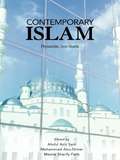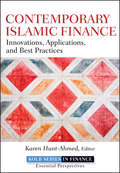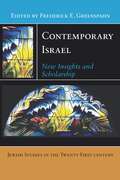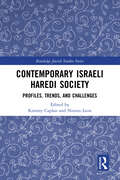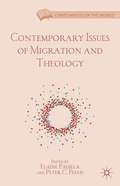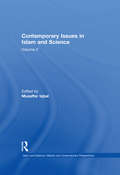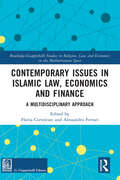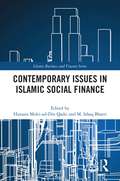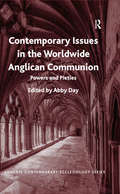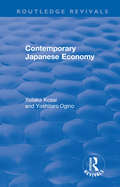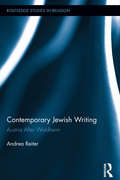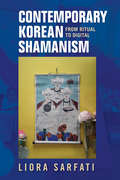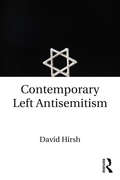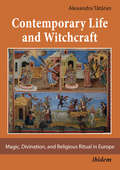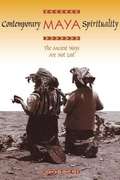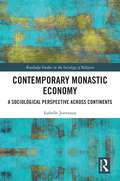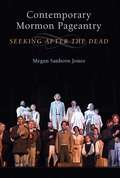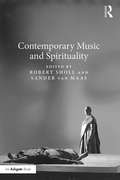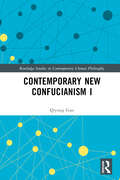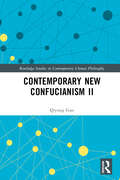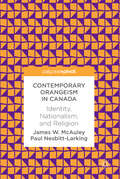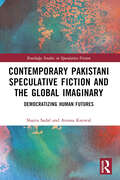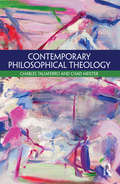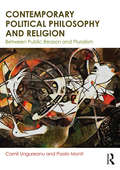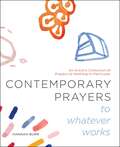- Table View
- List View
Contemporary Islam: Dynamic, not Static
by Mohammed Abu-Nimer Meena Sharify-Funk Abdul Aziz SaidContemporary Islam provides a counterweight to the prevailing opinions of Islamic thought as conservative and static with a preference for violence over dialogue. It gathers together a collection of eminent scholars from around the world who tackle issues such as intellectual pluralism, gender, the ethics of political participation, human rights, non-violence and religious harmony. This is a highly topical and important study which gives a progressive outlook for Islam's role in modern politics and society.
Contemporary Islamic Finance
by Karen Hunt-AhmedA comprehensive look at the innovations, applications, and best practices of Islamic financeIslamic-compliant finance is transacted in every major world financial center, and the need for information on the topic in light of its global reach has grown exponentially. As an expert in this field, author Karen Hunt-Ahmed understands the intricacies of this area of the capital markets. Now, along with the help of a number of experienced contributors, she skillfully addresses Islamic finance from the perspective of practitioners, examining issues in wealth management, contract law, private equity, asset management, and much more.Engaging and accessible, Contemporary Islamic Finance skillfully explains the practices and innovations of Islamic finance in everything from banking and real estate to private equity, asset management, and many other areas. It is intended to be the go-to resource for both Muslims as well as non-Muslims with an interest in the subject. Divided into three comprehensive parts, it will put you in a better position to understand, and excel at, this important endeavor.Introduces you to the history, legal structures, and basic financial contracts in the industryHighlights the various issues facing contemporary Islamic finance practitioners, and details their significance in the contemporary financial and cultural environmentIncludes case studies of United States-based transactions and related challenges and successesFilled with in-depth insights and expert advice, this detailed analysis of Contemporary Islamic Finance will help you gain a firm understanding of how effective this proven approach can be.
Contemporary Israel: New Insights and Scholarship (Jewish Studies in the Twenty-First Century #3)
by Frederick E. GreenspahnFor a country smaller than Vermont, with roughly the same population as Honduras, modern Israel receives a remarkable amount of attention. For supporters, it is a unique bastion of democracy in the Middle East, while detractors view it as a racist outpost of Western colonialism. The romanticization of Israel became particularly prominent in 1967, when its military prowess shocked a Jewish world still reeling from the sense of powerlessness dramatized by the Holocaust. That imagery has grown ever more visible, with Israel’s supporters idealizing its technological achievements and its opponents attributing almost every problem in the region, if not beyond, to its imperialistic aspirations.The contradictions and competing views of modern Israel are the subject of this book. There is much to consider about modern Israel besides the Middle East conflict. Over the past generation, a substantial body of scholarship has explored numerous aspects of the country, including its approaches to citizenship and immigration, the arts, the women’s movement, religious fundamentalism, and language; but much of that work has to date been confined within the walls of the academy. This book does not seek not to resolve either the country’s internal debates or its struggle with the Arab world, but to present a sample of contemporary scholars’ discoveries and discussions about modern Israel in an accessible way. In each of the areas discussed, competing narratives grapple for prominence, and it is these which are highlighted in this volume.
Contemporary Israeli Haredi Society: Profiles, Trends, and Challenges (Routledge Jewish Studies Series)
by Nissim Leon Kimmy CaplanThis edited volume offers profiles of contemporary Israeli Haredi (i.e., Jewish Ultra-Orthodox) society from several disciplinary points of view, resisting a generalized approach and examining the different, sometimes competing currents, that define it. It is argued that Haredi society has undergone a process of rejuvenation in recent history: demographically, it has experienced steady and consistent growth; on the Israeli political stage, Haredi parties have become increasingly influential; and culturally, the Haredi presence is increasingly felt in Israeli news media, popular movies, and TV series. Each of the chapters in the book focuses on a particular topic and combines research findings with an assessment of the current state of the field. These topics encompass Haredi ideology, politics, military service, education, geography, the media, and healthcare – together, they paint a complex picture of Haredi society as one of contradictory layers, dimensions, and aspects. Making sense of contemporary Haredi society is critical for anyone interested in understanding Israeli society as a whole, but the book will also appeal to historians of religion, scholars of contemporary conservative enclave religious societies and cultures, and those who focus on Jewish studies in the modern era.
Contemporary Issues Of Migration And Theology
by Peter C. Phan Elaine PadillaAlong with globalization migration poses unprecedented challenges to the Christian churches in the fields of constructive theology, ethics, spirituality, mission, ministry, interreligious dialogue, and theological education. How can the Christian churches successfully meet these challenges posed by global migratory movements? In suggesting ways that help the churches fulfill this task, the essays in this volume draw from a variety of streams of thought, including liberationist, postmodern, and postcolonial theologies, and from a wide range of contexts, such as the U. S. , Latin America, and Asia. They probe new ways of interpreting the Bible, the contributions of migrants to Christianity, the function of the city in religious developments, ways of being Christian, Christian mission, theological method, and theological education. The result is a theology of migration that is appropriate for the emerging World Christianity, as its approach is interdisciplinary, interdenominational, interreligious, and intercontinental.
Contemporary Issues in Islam and Science: Volume 2 (Islam and Science: Historic and Contemporary Perspectives)
by 1The articles selected for this volume explore emergent issues in the contemporary relationship between Islam and science and present studies of eight major voices in the discourse. Also included is a section on the operationalization of Islamic science in the modern world and a section on studies in traditional Islamic cosmology.
Contemporary Issues in Islamic Law, Economics and Finance: A Multidisciplinary Approach (Routledge-Giappichelli Studies in Religion, Law and Economics in the Mediterranean Space)
by Flavia CortelezziThis book explores how Islam can impact the structures and performance of firms, financial institutions and capital markets across a range of countries and industries. The Islamic finance industry represents an important reality not only because of the oil wealth of the Gulf states, which have fueled demand for such financial services, but also for an increased demand from a growing Muslim population in the West that aspires to express a full and all-inclusive religious identity. The increased demand for Muslim financial institutions has prompted Western non-Islamic firms to begin providing these services in an interesting effort of acculturation to the new plural scenario. By adopting a multidisciplinary approach, which also takes into account the theological, legal and geopolitical framework, the book offers a comprehensive picture of Islamic financial tools, contracts and business opportunities. Drawing on different fields of expertise, it deals with various themes, such as the theological roots of Islamic economics and finance and its geopolitical impact; the EU policy of cooperation with MENA and GCC countries; the instruments of Islamic finance, its legal principle and ability to become an instrument for enhancing business opportunities; the functioning of Islamic banks; the development of capital markets within a financial model influenced by religious constraints and, finally, the new relationships of this religious financial system with Western legal systems. The book thus provides a complete and extensive overview of the practice of Islamic finance through the lenses offered by studies of economics and management. Providing a careful analysis and an integrated framework of geo-economic and political issues, the book will be a valuable resource for academics, researchers and professionals in International Business, Entrepreneurship and Small Business Management, Law and Religion and Intercultural Studies.
Contemporary Issues in Islamic Social Finance (Islamic Business and Finance Series)
by M. Ishaq Bhatti Hussain Mohi-ud-Din QadriThe development of Islamic banking and finance (IBF) previously centred around three regions of the world: the Middle East, Southeast Asia, and South Asia. However, in recent years, this has expanded, as interest in IBF has gained momentum in Australia, the USA, and Europe, especially in the UK. Several Western market players have established their own Islamic window or subsidiaries to cater to the need of growing Muslim populations in these regions. This book examines the recent developments in IBF, particularly in the context of Islamic social finance instruments, such as Islamic microfinance, halal education, takaful, mutual funds, and waqf. It covers the religiosity, spirituality, and tawhid index, which promotes social well-being and empowerment. The book is interdisciplinary, and theories, practice, and key issues are presented simultaneously, introducing new ideas and techniques to the IBF community. Moreover, the book examines topics such as innovation in Islamic social finance instruments, advanced techniques of risk mitigation in Islamic capital markets, marketing and the halal industry, and shari’ah-compliant instruments, which are critical to Islamic finance. The book is an essential reference text for academics and research students at the master’s and doctorate levels in IBF.
Contemporary Issues in the Worldwide Anglican Communion: Powers and Pieties (Routledge Contemporary Ecclesiology)
by Abby DayContemporary Issues in the Worldwide Anglican Communion offers unique perspectives on an organisation undergoing significant and rapid change with important religious and wider sociological consequences. The book explores what the academic research community, Anglican clergy and laypeople are suggesting are critical issues facing the Anglican communion as power and authority relations shift, including: gender roles, changing families, challenges of an aging population, demands and opportunities generated by young people, mobility and mutations of worship communities; contested conformities to policies surrounding sexual orientation, impact of social class and income differences, variable patterns of congregational growth and decline, and global power and growth shifts from north to south.
Contemporary Japanese Economy (Studies In The Modern Japanese Economy Ser.)
by Yutaka Kosai Yoshitaro OginoThis title was first published in 1984. Examining the development of the Japanese economy, this book examines the position of Japan's economy in the world, the internal structure of the large corporation system and the life of the Japanese people.
Contemporary Jewish Writing: Austria After Waldheim (Routledge Studies in Religion #33)
by Andrea ReiterThis book examines Jewish writers and intellectuals in Austria, analyzing filmic and electronic media alongside more traditional publication formats over the last 25 years. Beginning with the Waldheim affair and the rhetorical response by the three most prominent members of the survivor generation (Leon Zelman, Simon Wiesenthal and Bruno Kreisky) author Andrea Reiter sets a complicated standard for ‘who is Jewish’ and what constitutes a ‘Jewish response.’ She reformulates the concepts of religious and secular Jewish cultural expression, cutting across gender and Holocaust studies. The work proceeds to questions of enacting or performing identity, especially Jewish identity in the Austrian setting, looking at how these Jewish writers and filmmakers in Austria ‘perform’ their Jewishness not only in their public appearances and engagements but also in their works. By engaging with novels, poems, and films, this volume challenges the dominant claim that Jewish culture in Central Europe is almost exclusively borne by non-Jews and consumed by non-Jewish audiences, establishing a new counter-discourse against resurging anti-Semitism in the media.
Contemporary Korean Shamanism: From Ritual to Digital
by Liora SarfatiOnce viewed as an embarrassing superstition, the theatrical religious performances of Korean shamans—who communicate with the dead, divine the future, and become possessed—are going mainstream. Attitudes toward Korean shamanism are changing as shamanic traditions appear in staged rituals, museums, films, and television programs, as well as on the internet.Contemporary Korean Shamanism explores this vernacular religion and practice, which includes sensory rituals using laden altars, ecstatic dance, and animal sacrifice, within South Korea's hypertechnologized society, where over 200,000 shamans are listed in professional organizations. Liora Sarfati reveals how representations of shamanism in national, commercialized, and screen-mediated settings have transformed opinions of these religious practitioners and their rituals.Applying ethnography and folklore research, Contemporary Korean Shamanism maps this shift in perception about shamanism—from a sign of a backward, undeveloped Korea to a valuable, indigenous cultural asset.
Contemporary Left Antisemitism
by David HirshToday’s antisemitism is difficult to recognize because it does not come dressed in a Nazi uniform and it does not openly proclaim its hatred or fear of Jews. This book looks at the kind of antisemitism which is tolerated or which goes unacknowledged in apparently democratic spaces: trade unions, churches, left-wing and liberal politics, social gatherings of the chattering classes and the seminars and journals of radical intellectuals. It analyses how criticism of Israel can mushroom into antisemitism and it looks at struggles over how antisemitism is defined. It focuses on ways in which those who raise the issue of antisemitism are often accused of doing so in bad faith in an attempt to silence or smear. Hostility to Israel has become a signifier of identity, connected to opposition to imperialism, neo-liberalism and global capitalism; the ‘community of the good’ takes on toxic ways of imagining most living Jewish people.
Contemporary Life and Witchcraft: Magic, Divination, and Religious Ritual in Europe
by Alexandra TātāranWitchcraft is very much alive in today's post-communist societies. Stemming from ancient rural traditions and influenced by modern New Age concepts, it has kept its function as a vibrant cultural code to combat the adversities of everyday life. Intricately linked to the Orthodox church and its rituals, the magic discourse serves as a recourse for those in distress, a mechanism to counter-balance misfortune and, sometimes, a powerful medium for acts of aggression.In this fascinating book, Alexandra Tataran skillfully re-contextualizes the vast and heterogenuous discourse on contemporary witchcraft. She shows how magic, divination, and religious rituals are adapted to the complex mechanisms of modern mentalities and urban living in the specific historical and social context of post-communist countries. Based on years of first-hand fieldwork, Tataran offers fascinating insights into the experience of individuals deeming themselves bewitched and argues that the practice can also teach us a lot about particular forms of adapting traditions and resorting to pre-existing cultural models.
Contemporary Maya Spirituality
by Jean Molesky-PozSince the mid-1980s, when Guatemala returned to civilian rule and achieved relative peace and stability, the Maya have begun openly expressing their spiritual beliefs and practices. Jean Molesky-Poz draws on in-depth dialogues with Maya Ajq'ijab' (keepers of the ritual calendar), her own participant observation, and inter-disciplinary resources to offer a comprehensive, innovative, and well-grounded understanding of contemporary Maya spirituality and its theological underpinnings. She reveals significant continuities between contemporary and ancient Maya worldviews and spiritual practices. Molesky-Poz opens with a discussion of how the public emergence of Maya spirituality is situated within the religious political history of the Guatemalan highlands, particularly the recent pan-Maya movement. She investigates Maya cosmovision and its foundational principles, as expressed by Ajq'ijab'. At the heart of this work, Ajq'ijab' interpret their obligation, lives, and spiritual work. In subsequent chapters, Molesky-Poz explores aspects of Maya spirituality-sacred geography (the reciprocal relationship between the earth and humans, sacred places, and the significance of the cross or quatrefoil map), sacred time (how the 260-day sacred calendar is "the heart of the wisdom of the Maya," the matrix of Maya culture), and ritual practice (the distinct way and method of ancestral study, with special attention to fire ceremonialism). She confirms contemporary Maya spirituality as a faith tradition with elaborate historical roots that has significance for individual, collective, and historical lives, reaffirming its own public space and legal right to be practiced.
Contemporary Monastic Economy: A Sociological Perspective Across Continents (Routledge Studies in the Sociology of Religion)
by Isabelle JonveauxThis book examines the economy of contemporary Catholic monasticism from a sociological perspective, considering the ways in which monasteries engage with the capitalist world economy via a model which aims less at ‘performance’ per se, than at the fulfilment of human and religious values. Based on fieldwork across several countries in Europe, Africa and South America, it explores not only the daily work and economy in monastic communities in their tensions with religious life, but also the new interest from society in monastic products or monastic management. With attention to present trends in monastic economy, including the growth of ecology and the role of monasteries in the social and economic development of their localities, the author demonstrates that monastic economy consists not solely in the subsistence of religious communities outside the world, but in economic activity that has a real impact on its local or even more global environment, in part through transnational networks of monasteries. As such, Contemporary Monastic Economy: A Sociological Perspective will appeal to scholars of religious studies and sociology with interests in contemporary monasticism.
Contemporary Mormon Pageantry: Seeking After the Dead
by Megan S JonesIn Contemporary Mormon Pageantry, theater scholar Megan Sanborn Jones looks at Mormon pageants, outdoor theatrical productions that celebrate church theology, reenact church history, and bring to life stories from the Book of Mormon. She examines four annual pageants in the United States-the Hill Cumorah Pageant in upstate New York, the Manti Pageant in Utah, the Nauvoo Pageant in Illinois, and the Mesa Easter Pageant in Arizona. The nature and extravagance of the pageants vary by location, with some live orchestras, dancing, and hundreds of costumed performers, mostly local church members. Based on deep historical research and enhanced by the author's interviews with pageant producers and cast members as well as the author's own experiences as a participant-observer, the book reveals the strategies by which these pageants resurrect the Mormon past on stage. Jones analyzes the place of the productions within the American theatrical landscape and draws connections between the Latter-day Saints theology of the redemption of the dead and Mormon pageantry in the three related sites of sacred space, participation, and spectatorship. Using a combination of religious and performance theory, Jones demonstrates that Mormon pageantry is a rich and complex site of engagement between theater, theology, and praxis that explores the saving power of performance.
Contemporary Music and Spirituality
by Sander Van Maas Robert ShollThe flourishing of religious or spiritually-inspired music in the late twentieth and early twenty-first centuries remains largely unexplored. The engagement and tensions between modernism and tradition, and institutionalized religion and spirituality are inherent issues for many composers who have sought to invoke spirituality and Otherness through contemporary music. Contemporary Music and Spirituality provides a detailed exploration of the recent and current state of contemporary spiritual music in its religious, musical, cultural and conceptual-philosophical aspects. At the heart of the book are issues that consider the role of secularization, the claims of modernity concerning the status of art, and subjective responses such as faith and experience. The contributors provide a new critical lens through which it is possible to see the music and thought of Cage, Ligeti, Messiaen, Stockhausen as spiritual music. The book surrounds these composers with studies of and by other composers directly associated with the idea of spiritual music (Harvey, Gubaidulina, MacMillan, Pärt, Pott, and Tavener), and others (Adams, Birtwistle, Ton de Leeuw, Ferneyhough, Ustvolskaya, and Vivier) who have created original engagements with the idea of spirituality. Contemporary Music and Spirituality is essential reading for humanities scholars and students working in the areas of musicology, music theory, theology, religious studies, philosophy of culture, and the history of twentieth-century culture.
Contemporary New Confucianism I (Routledge Studies in Contemporary Chinese Philosophy)
by Qiyong GuoAs the first volume of a two-volume seminal work on contemporary New Confucianism in China, this book charts the development of this intellectual trend and examines four leading thinkers of this intellectual movement in the 20th century. Contemporary New Confucianism refers to the Confucianism or Confucian thought that has emerged in China since the 1920s and that seeks to revive Confucian spirituality in a changing society. This volume first analyzes the cultural context, logical approach, major themes, and problems of New Confucianism before delving into the four leading figures, namely Liang Shumin, Xiong Shili, Ma Yifu, and Qian Mu. The chapter on Liang Shumin analyzes his concept of will, his arguments on Confucian moral ideals, and his theory of culture. It then discusses Xiong Shili's contribution to the philosophical metaphysics of New Confucianism. The following chapter on Ma Yifu examines his theory of the mind, nature, and the six arts. The final chapter on Qian Mu presents his views on nationality, history, and the Chinese classics. This title will appeal to scholars and students of modern and contemporary Confucianism, intellectual history, philosophy and thought of contemporary China, and comparative philosophy.
Contemporary New Confucianism II (Routledge Studies in Contemporary Chinese Philosophy)
by Qiyong GuoAs the second volume of a two-volume seminal work on contemporary New Confucianism in China, this book focuses on six leading thinkers of this intellectual movement in the 20th century. Contemporary New Confucianism refers to the Confucianism or Confucian thought that has emerged in China since the 1920s, which aims to revive the spirituality of Confucianism in a changing society. This volume introduces the philosophical thought of Zhang Junmai, Feng Youlan, He Lin, Fang Dongmei, Tang Junyi, and Mou Zongsan, including Zhang's political philosophy and comparative philosophy, Feng's transformation of Chinese philosophy, He's idea of culture and "spirit-only idealism," Fang's comparative philosophy, Tang's idea of moral self and theory of human spiritual realms, and Mou's new ontology for Confucianism. It analyzes their divergences and the contemporary relevance of their thought in terms of revisiting and transforming traditional Chinese philosophy and reconciling Chinese and Western traditions. This title will appeal to scholars and students of modern and contemporary Confucianism, intellectual history, philosophy and thought of contemporary China, and comparative philosophy.
Contemporary Orangeism in Canada: Identity, Nationalism, and Religion
by James W. Mcauley Paul Nesbitt-LarkingThis book uses original research and interviews to consider the views of contemporary members of the Orange Order in Canada, including their sense of political and societal purpose, awareness of the decline of influence, views on their present circumstances, and hopes for the future of Orangeism in Canada. In so doing, it details the organisational structure of Canadian society: the role of religion in public life, the changing context of multicultural Canada, and the politics of resistance of a political and social organisation in decline. This book offers a social scientific complement to existing historical work on the role of the Orange Order in Canadian society, and builds upon it through an analysis of contemporary Orangeism. It considers the Orange Order as a worldwide body and makes some comparisons and contrasts with its organisational status and membership in Ireland and elsewhere. As such, the book makes a distinctive contribution to our knowledge of a fraternal organisation and the role of religious belief and politics in contemporary society.
Contemporary Pakistani Speculative Fiction and the Global Imaginary: Democratizing Human Futures (Routledge Studies in Speculative Fiction)
by Aroosa Kanwal Shazia SadafAs the first book-length study of emergent Pakistani speculative fiction written in English, this critical work explores the ways in which contemporary Pakistani authors extend the genre in new directions by challenging the cognitive majoritarianism (usually Western) in this field. Responding to the recent Afro science fiction movement that has spurred non-Western writers to seek a democratization of the broader genre of speculative fiction, Pakistani writers have incorporated elements from djinn mythology, Qur'anic eschatology, "Desi" (South Asian) traditions, local folklore, and Islamic feminisms in their narratives to encourage familiarity with alternative world views. In five chapters, this book analyzes fiction by several established Pakistani authors as well as emerging writers to highlight the literary value of these contemporary works in reconciling competing cognitive approaches, blurring the dividing line between "possibilities" and "impossibilities" in envisioning humanity’s collective future, and anticipating the future of human rights in these envisioned worlds.
Contemporary Philosophical Theology
by Charles Taliaferro Chad MeisterIn Contemporary Philosophical Theology, Charles Taliaferro and Chad Meister focus on key topics in contemporary philosophical theology within Christianity, Islam, and Judaism, as well as Hinduism and Buddhism. The volume begins with a discussion of key methodological tools available to the philosophical theologian, such as faith and reason, science and religion, revelation and sacred scripture, and authority and tradition. The authors use these tools to explore subjects including language, ineffability, miracles, evil, and the afterlife. They also grapple with applied philosophical theology, including environmental concerns, interreligious dialogue, and the nature and significance of political values. A concluding discussion proposes that philosophical theology can contribute to important reflections and action concerning climate change.
Contemporary Political Philosophy and Religion: Between Public Reason and Pluralism
by Camil Ungureanu Paolo MontiWhat is the place of religion in a pluralist democracy? The continuous presence of religion in the public sphere has raised anew normative and practical issues related to the role of religion in a democratic polity, generating spirited political debates in Western and non-Western contexts. Contemporary Political Philosophy and Religion provides an advanced introduction to, and a critical appraisal of, the major schools of political thought with a focus on the relationship between democracy and religion. Key features of this book include: Analyses of different political traditions: liberalism, republicanism, deliberative democracy, feminism, postmodernism, multiculturalism, and interculturalism; Critical discussions of key contemporary philosophers, such as John Rawls, Jürgen Habermas, Richard Rorty, Charles Taylor, Susan Moller Okin, Martha Nussbaum, Will Kymlicka, Chandran Kukathas, and Bhiku Parekh; A pluralist approach that questions the strict divide between analytical and continental political philosophy; Discussion on the place of religion in politics from multiple perspectives by drawing on a plurality of political contexts, both Western and non-Western; Analyses of legal and political cases related to different religious traditions, for example, Islam, Confucianism, Buddhism, Christianity, and Hinduism. This comprehensive text will be of great use to students of religion and politics in the fields of political and legal theory, and religious and theological studies, while also offering critical insights and arguments that will be of interest to the experts in the field.
Contemporary Prayers to Whatever Works: An Artist's Collection of Prayers to Nothing-in-Particular
by Hannah BurrA gorgeously illustrated collection of contemporary prayers, affirmations, and meditations for anyone in need of guidance, reassurance, and peace. Everyone has little moments of frustration, fear, or sadness, often littered throughout the day. Whether you are religious, spiritual, or just in need of some support, it is often in these small moments, as much as in the big ones, that we would benefit from the presence of a higher power. This open-minded book has simple prayers and meditations to help you connect. The prayers are nondenominational and encourage you, no matter your creed, to take a moment, breathe, and reconnect with the support that is out there, waiting for you. As a conceptual artist, Hannah Burr has used her art to stand in for a deity or higher power, providing accessible and beautiful pieces to help you on your spiritual journey. Take Contemporary Prayers to Whatever Works with you on the go or keep it by your bedside. This versatile book is designed to be a spiritual companion whenever you need a little inner harmony.
